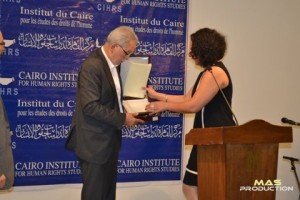 OHCHR: The CIHRS gave a voice to those afraid to speak, combated religious bigotry, and earned credibility in the Arab world and internationally.
OHCHR: The CIHRS gave a voice to those afraid to speak, combated religious bigotry, and earned credibility in the Arab world and internationally.
Tunis— April 23, 2015, the Cairo Institute for Human Rights Studies organized a celebration in Tunis to mark its 21st anniversary. The Minister of Justice Mohammed Saleh Bin Eissa, the Moroccan ambassador, and diplomats and representatives of the embassies of the US, UK, France, Belgium, Japan, Finland, and The EU mission in Tunisia joined in the celebrations.
The director of the Tunis bureau of the UN Office of the High Commissioner for Human Rights, Dimiter Chalev, was also present, as were representatives of international and local civil society, among them Idris al-Yazmi, the head of the National Council for Human Rights in Morocco; al-Mukhtar al-Tarifi, the representative of the International Federation for Human Rights in Tunisia, and Bushra Belhaj, the chair of the rights and liberties committee in the Tunisian parliament.
The occasion was inaugurated with a one-minute silence in tribute to the victims of human rights abuses and terrorism in the Arab region. This was, followed by a note sent by the High Commissioner on Human Rights Zeid Bin Raad al-Husseini, who was unable to attend. In the note, Raad said that the Arab world was currently facing two related challenges: the transition to more stable democratic societies and the alarming increase in violence in the context of the rise of ISIS and other extremist takfiri groups. This lends even greater importance to rights organizations in the region that can analyze these difficulties, spread a culture of tolerance, promote respect for human rights, and engage in a constructive dialogue on cultures and global human rights standards. For more than two decades, Raad said, the CIHRS has been engaged in these missions, becoming a strong advocate and defender of human rights that has won international recognition and several awards. It also enjoys credibility in the region, having given a voice to those who are afraid to speak and stood up against religious bigotry and hate speech.
Tunisian Minister of Defense Farhat Horchani also sent a note of congratulations to the CIHRS, expressing his regret for being unable to attend. This may be the first time a rights group has received such a missive from a defense minister in the region. Horchani, who has no military background, was the dean of the Faculty of Law and Political Science in Tunis, the chair of the Tunisian Association for Constitutional Law, and a member of several other civic associations. A UN expert, he was also a member of the High Body for the Realization of the Objectives of the Revolution in Tunisia. The Ministry of Women apologized for not attending, but also sent its congratulations and wished the CIHRS the best for its new start in Tunisia.
During the celebration, special tribute was paid to Minister of Constitutional Bodies and Civil Society Kamal Jendoubi, the chair of the CIHRS board of directors. Participants paid tribute to his years of struggle and advocacy in the region, and the CIHRS gave him a commemorative gift in honor of his profound efforts devoted to the Institute over two decades and ‘in recognition and gratitude for decades of work with integrity, sincerity, insight, and the commitment and dedication and unlimited loyalty to all human rights issues.”
Jendoubi said he considered the gesture an honor for the Arab rights movement and the values and principles in defense of which many have been imprisoned, including Nabeel Rajab and Abd al-Hadi Khawaja in Bahrain, Mazen Darwish in Syria, Alaa Abd al-Fattah and his comrades in Egypt, and other human rights defenders in the region.
In his speech, Dimiter Chalev from the OHRC noted that “We are celebrating two occasions today, the 21st anniversary or the birth day of the Cairo institute, one of the most distinguished and long standing human rights NGOs in the MENA region, as well as honoring one of the most persistent and pioneering human rights defender not only at the Tunisian level but also at the regional and international levels, (Kamal Jendoubi.) Both have been of great assistance to the region and have been contributing to defending and highlighting human rights concerns in the region.”
Chalev added; “We as OHCHR in general and Tunisia office in particular worked and will continue to work with (CIHRS) both in advocating, protection and capacity building in the area of human rights and contributing to widening democratic space, freedom of expression, supporting human rights defenders, rule of law, and promoting inclusion rather than exclusion.“
The celebration concluded with a word from CIHRS director Bahey eldin Hassan, who expressed his gratitude to all those who supported CIHRS in its long journey on the regional and international levels, as well as the Institute’s staff. He especially thanked Tunisian civil society for welcoming and offering support to the new CIHRS branch office in Tunis. Hassan noted that this is an historic moment for the Arab region, with increased concern for the respect for human rights. It is not coincidence, Hassan also added, that the states that collapsed states (Syria, Libya, and Iraq) in which terrorist chose to settle, were ruled by the worst of the dictatorships for more three decades.
Founded as a regional organization in 1994 in Cairo, the CIHRS developed its perspective on change and its priorities and strategies based on its vision of the nature of the human rights problem in the Arab world. It began to expand with the goal of strengthening its capacities to defend human rights, establishing an office in Geneva to promote coordination and ties between rights organizations in the Arab world and the OHCHR and the UN Human Rights Council. In 2014, it opened a regional branch office in Tunis and appointed a permanent representative in Brussels; it intends to soon open a branch office in another country.
Share this Post

